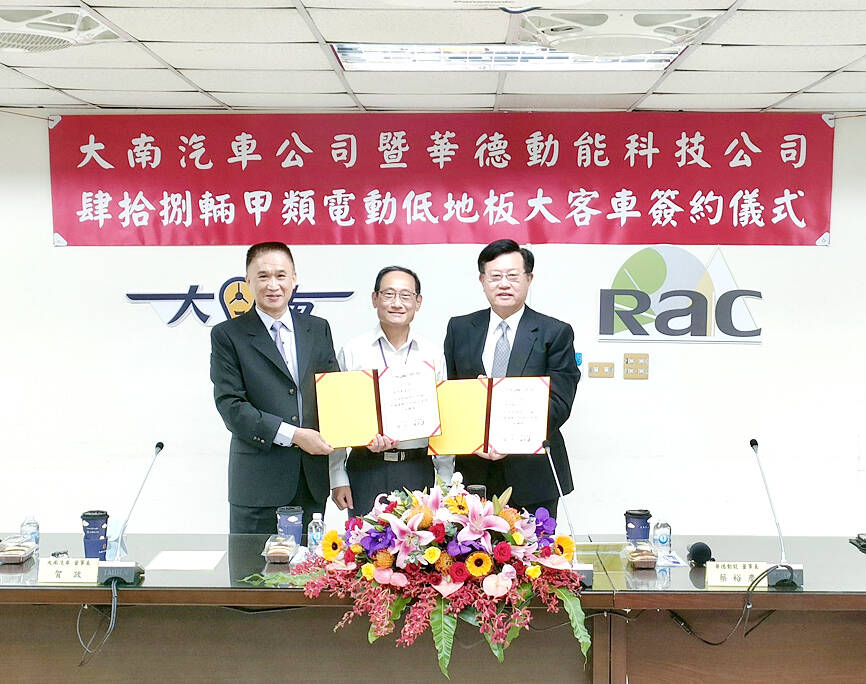RAC Electric Vehicles Inc (華德動能科技) has landed a NT$550 million (US$17.4 million) order from local bus operator Danan Bus Co (大南客運) to supply electric buses and deploy charging piles.
RAC has been contracted to deliver the first of the 48 electric buses to Danan Bus next year, the company said in a statement on Wednesday following a signing ceremony in Taipei.
The electric buses are expected to operate between the Taipei MRT’s Xinbeitou and Taipei City Hall stations, it said.

Photo courtesy of RAC Electric Vehicles Inc
RAC is to help install charging piles with a 120 kilowatt capacity, and build energy storage cabinets in the bus operator’s operation control center in Taipei’s Beitou District (北投), the statement said.
The charging piles and energy storage systems are to be designed and manufactured by RAC’s parent company, Mobiletron Co (車王電子), the statement said.
Maxine Technology Co (銓鼎科技), a subsidiary of RAC, is to help design vehicle fleet management software, a battery charging management system and an energy management system, it said.
RAC this year has signed orders to supply 64 electric buses to operators in Taiwan, it added.
RAC said it is confident that it would obtain subsidies from the Ministry of Transportation and Communications to build new electric buses.
The company in January received ministry subsidies of NT$10 million per vehicle to produce 105 electric buses.
The ministry has set a goal to electrify the nation’s buses entirely by 2030 through subsidizing electric buses.
RAC in June expanded its business in Japan to supply electric buses to Nishi-Nippon Railroad Co in Fukuoka City, the statement said.
RAC began using a new plant in Taichung this quarter to support growing customer demand locally and abroad, it said.

UNCERTAINTY: Innolux activated a stringent supply chain management mechanism, as it did during the COVID-19 pandemic, to ensure optimal inventory levels for customers Flat-panel display makers AUO Corp (友達) and Innolux Corp (群創) yesterday said that about 12 to 20 percent of their display business is at risk of potential US tariffs and that they would relocate production or shipment destinations to mitigate the levies’ effects. US tariffs would have a direct impact of US$200 million on AUO’s revenue, company chairman Paul Peng (彭雙浪) told reporters on the sidelines of the Touch Taiwan trade show in Taipei yesterday. That would make up about 12 percent of the company’s overall revenue. To cope with the tariff uncertainty, AUO plans to allocate its production to manufacturing facilities in

TAKING STOCK: A Taiwanese cookware firm in Vietnam urged customers to assess inventory or place orders early so shipments can reach the US while tariffs are paused Taiwanese businesses in Vietnam are exploring alternatives after the White House imposed a 46 percent import duty on Vietnamese goods, following US President Donald Trump’s announcement of “reciprocal” tariffs on the US’ trading partners. Lo Shih-liang (羅世良), chairman of Brico Industry Co (裕茂工業), a Taiwanese company that manufactures cast iron cookware and stove components in Vietnam, said that more than 40 percent of his business was tied to the US market, describing the constant US policy shifts as an emotional roller coaster. “I work during the day and stay up all night watching the news. I’ve been following US news until 3am

Taiwan will prioritize the development of silicon photonics by taking advantage of its strength in the semiconductor industry to build another shield to protect the local economy, National Development Council (NDC) Minister Paul Liu (劉鏡清) said yesterday. Speaking at a meeting of the legislature’s Economics Committee, Liu said Taiwan already has the artificial intelligence (AI) industry as a shield, after the semiconductor industry, to safeguard the country, and is looking at new unique fields to build more economic shields. While Taiwan will further strengthen its existing shields, over the longer term, the country is determined to focus on such potential segments as

COLLABORATION: Given Taiwan’s key position in global supply chains, the US firm is discussing strategies with local partners and clients to deal with global uncertainties Advanced Micro Devices Inc (AMD) yesterday said it is meeting with local ecosystem partners, including Taiwan Semiconductor Manufacturing Co (TSMC, 台積電), to discuss strategies, including long-term manufacturing, to navigate uncertainties such as US tariffs, as Taiwan occupies an important position in global supply chains. AMD chief executive officer Lisa Su (蘇姿丰) told reporters that Taiwan is an important part of the chip designer’s ecosystem and she is discussing with partners and customers in Taiwan to forge strong collaborations on different areas during this critical period. AMD has just become the first artificial-intelligence (AI) server chip customer of TSMC to utilize its advanced